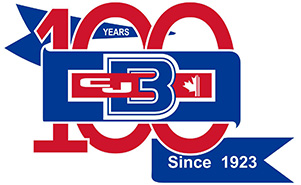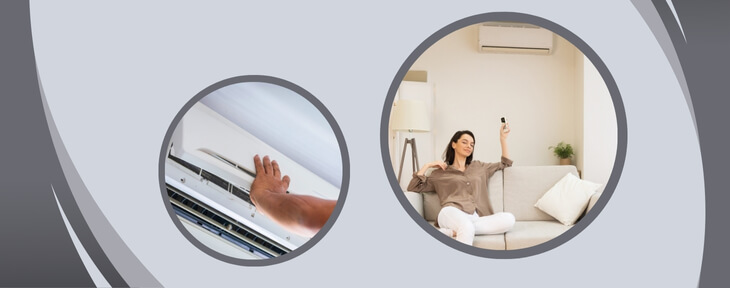When summer hits, there’s nothing better than walking into a cool, comfortable home. But what happens when your air conditioner isn’t working properly? Air conditioning repair can be an expensive and daunting task, but it doesn’t have to be. Knowing about the most common problems with air conditioners and how to fix them can save you time and money. From refrigerant leaks to faulty wiring, there are a variety of issues that can arise that negatively impact its performance.
In this blog post, our experts at CJ Brubacher dive into the top 5 most common air conditioning problems, go over what causes them, and provide tips on how to fix them. By the end of this article, you’ll have the knowledge and confidence to troubleshoot your air conditioning system and get it running smoothly.
1. Low Airflow: Causes and Simple Solutions
Low airflow from your HVAC can turn what should be a relief from the heat into a stifling situation. This common problem usually results from a dirty air filter or blocked condenser coils, but can also be caused by a faulty fan motor or a malfunctioning thermostat.
Before we deep dive into technical fixes, check your thermostat’s settings. Ensure it’s set to “cool” and at the desired temperature. Overlooking such a rudimentary setup is more common than you’d think!
Cleaning Your Air Filter:
- Turn off your AC.
- Remove the filter.
- Carefully vacuum the dirt and dust off.
- If it’s still dirty, rinse with tepid water – using hot water can cause the filter to warp.
- Allow the filter to air dry completely before reinstalling it.
Still feeling the heat? It might be due to blocked condenser coils.
Clearing Your Condenser Coils:
- Shut off the power to your unit.
- Find the condenser coil – it’s on the outside unit.
- Use a coil brush to gently clean off the debris.
- Spray with a hose to remove any remaining dirt – just remember not to use high pressure as it can bend the fins.
If neither of these DIY fixes work, it may be time to call in the professionals as the issue could lie with a faulty fan motor or a problem with the actual AC unit.
2. Air Conditioner Blowing Warm Air: Troubleshooting Tips
There’s hardly anything more frustrating on a hot summer day than feeling warm air blowing out of your AC unit. But don’t sweat it just yet! Warm air blowouts can be caused by a variety of factors, and in many cases, an easy fix can reinstate the refreshing chill in your home. Let’s dive into the common causes and potential solutions:
Cause: Incorrect Thermostat Settings
Check your thermostat. It may sound simple, but sometimes the solution is as straightforward as making sure your thermostat is set to “cool”, not “heat”, and its fan is set to “auto”, not “on”. If the settings are correct but you still have a problem, your thermostat might be faulty.
Solution:
Consider replacing your old thermostat with a programmable one. Not only will it prevent such mix-ups, but a programmable thermostat can also boost your AC system’s efficiency, saving you money on energy bills.
Cause: Low Refrigerant Levels
Your air conditioner’s refrigerant is crucial for cooling your home. If the refrigerant level is low, your AC may blow warm air. Remember that refrigerant isn’t something that gets “used up”; if you’re low, it means there’s a leak.

Solution:
Refrigerant handling requires professional skills and certifications due to its potentially hazardous nature. If you suspect your AC is low on refrigerant, call a professional HVAC technician immediately.
Cause: Faulty Compressor
The compressor is the heart of your AC unit, responsible for pumping refrigerant and removing heat from the air. If it fails, your AC won’t cool effectively, or it may blow warm air.
Solution:
Compressor repairs or replacements should be handled by a professional. If you suspect a compressor problem, schedule an appointment with a reliable specialist pronto.
While some of these fixes might be quick and simple DIY jobs, others require professional expertise. It’s crucial to understand when to call in the pros so that you don’t escalate a small problem into a major breakdown. No matter the issue, preventative maintenance is always beneficial to keep your AC running perfectly.
3. Air Conditioner Not Turning On: Potential Reasons and Solutions
There could be several reasons behind this issue which can either be easy or complex fixes. Let’s dive into the common causes and appropriate solutions.
Cause: Circuit Breaker Tripped
One of the most common reasons for your air conditioner not turning on could be a tripped circuit breaker. The power surge during an electrical storm or overloading may have caused the breaker to trip to prevent damage.
Solution: Resetting the Circuit Breaker
Head over to your home’s circuit breaker panel and look for the switch that controls your AC. If it’s been tripped, it will be in the ‘off’ position. To fix it, you should first turn it to the ‘off’ position, then flip it back to ‘on’. Remember to wait a few minutes before turning your unit back on to avoid any damage.
Cause: Faulty Thermostat
A non-functioning thermostat could be another possible culprit that’s preventing your air conditioner from kicking into action. With time, your thermostat may become malfunctioning due to worn-out wiring, dust accumulation, or bad batteries.
Solution: Replace Batteries or Clean the Thermostat
If the display on your thermostat is blanking or displaying an error message, it may be time to replace the batteries or give it a clean. Use a soft brush to gently remove dust and debris from inside the thermostat, and consider replacing batteries if it’s been a while. If cleaning or changing batteries doesn’t resolve the issue, you may need to consult with a professional HVAC technician.
In case none of these solutions work, it’s probably time to call in an experienced professional for expert advice.
4. Clogged Air Filters: A Common Culprit for AC Problems
If you haven’t checked or changed your air filter in a while, it could likely be the source of the problems you’re facing. A clogged filter restricts the flow of air, making your air conditioning unit work harder than it should to cool your home. This can not only drive up your power bills but also put unnecessary strain on your unit, potentially damaging its components.
Regular Maintenance and Filter Replacement
Don’t worry, this problem is fairly easy to tackle. The solution to a clogged air filter is as simple as regular maintenance, and if necessary, filter replacement. Most manufacturers recommend that you check your filter at least once a month, and replace it as necessary, usually every 1-3 months. However, if you have pets or if a member of your household has allergies, you might need to change your filter more frequently.
5. Leaking Water from the Air Conditioner: Causes and Fixes
You might see water pooling around your AC unit and that isn’t a good sign. Don’t panic, though – we’re here to break down the causes and hand you the fixes.
Cause: Clogged or Disconnected Drain Line
Clogged drain lines are less than ideal – blockages can occur due to dust, dirt, or even mold. The result? The water backed up in your AC system has nowhere to go, so it does the only other thing it can do: it leaks. If the drain line isn’t clogged up, then it may have disconnected from the AC unit.
Solution: Clean the Drain Line or Reconnect it
Cleaning your drain line can be as simple as using a wet/dry vacuum to suction out the clog, but if you’re not comfortable tackling this on your own – call in a professional. If the drain line has simply disconnected from the unit, it’s easy to reconnect – just make sure it’s securely attached.
Cause: Frozen Evaporator Coils
Your AC unit draws in warm air from your home, and then its evaporator coils cool that air and blow it back out. However, low refrigerant levels can cause these coils to freeze. When they eventually defrost, the excess water may end up in places it shouldn’t be – like your living room.
Solution: Refill or Repair Leaks in the Refrigerant Line
Refilling your refrigerant can solve the issue if the levels are low. An HVAC professional will be able to do this for you, but if your refrigerant is leaking, that leak needs to be found and repaired ASAP.
Contact CJ Brubacher for Professional Air Conditioning Repair
Don’t let AC troubles turn your summer into a sweat fest. When quick fixes don’t cut it, it’s time to call in the professionals. Get in touch with CJ Brubacher today. Our team of expert technicians is ready and waiting to tackle your air conditioning woes and restore your home’s comfort. Take action now to ensure a cool, worry-free summer. Click here to contact us now.

